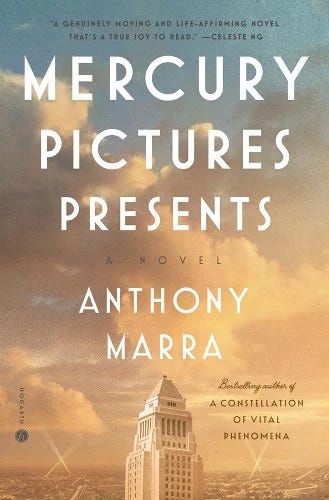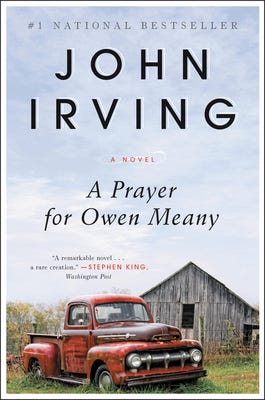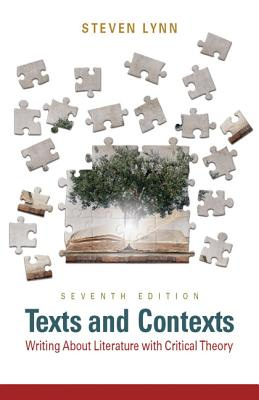Here’s an obvious statement about myself: I like reading.
I assume that subscribers to a newsletter like this one also love reading, but does anyone else wonder what it is they like about reading? Some will say they enjoy the escape, and I understand that sentiment, but I tend to read not for escape for for engagement. One of the reasons I (and maybe others) had such a hard time reading during the early moths of the pandemic was because it was hard to engage with anything of substance.
I think about this question a fair bit, and have been thinking about it more specifically in the wake of reading Mercury Pictures Presents by Anthony Marra, the subject of my “appreciation” in this weekend’s Chicago Tribune.1
Reading the book was one of those experiences where I was just so pleased to spend time in the world Marra had created. In our Tournament of Books commentaries, Kevin Guilfoile and I often talk about books that are “good company,” as in literal companions for the time it takes to read the book. That quality can be ineffable, and it need not be present for me to enjoy a book, but when it’s there, it’s an awesome sensation. It really is a you know it when you feel it type of thing. I sometimes think of it as something like charisma in an actor on the screen.
(As an aside, in my opinion, the most charismatic screen presence of my lifetime is Denzel Washington. He’s been in some genuinely mediocre movies, but he himself is always supremely watchable. Even in interviews this quality comes across. I love this short clip of him talking about being compared to Sidney Poitier, how it shows how compelling Washington is, swinging from one mood to another in an instant.)
Some books just charm you in a way that extends beyond whatever art and craft went into the creation of the book.
There’s something a little mystical about that kind of joining between author and reader and having that kind of experience is one of the reasons I read, one of the reasons I’ve been a reader for basically my entire life.
This is also what makes me a lousy candidate as a book reviewer, or an even tougher job, book criticism. Book critics are a vanishing breed as both the demand for genuine criticism among readers and the supply of outlets that publish book criticism have been shrinking.
I recently subscribed to Christian Lorentzen’s Substack, “Christian Lorentzen’s Diary,” and have been enjoying my chance to work through his archives. Lorentzen has long been one of my favorite critics because he reads closely, and has strong opinions (some of them negative), but is also open and generous with his assessments. I also get a kick that he might find at least parts of my project here unpalatable.
In a recent entry, “Against Recommendation Culture,” Lorentzen laments how much of public book discourse is some version of “recommendation culture,” the ne plus ultra of which (for now) is BookTok. I’m sympathetic to his argument, even as it indicts some of my own behaviors. After all, my whole shtick is recommending books. Now, I like to think I smuggle some other things under that umbrella, but the gimmick is what tends to grab people. I also can’t help but note that the consistently most accessed links in my weekly roundup is anything connected to a list of what people should read.
I know I’m reading interesting criticism when the critic makes me rethink something.
Reading critics you have to be prepared to hear why a book you liked (or even loved) is, in the view of the critic, not a good book, or the reverse, why a book I loathed is actually of high quality. Like I said, I love it when this happens.
I love this because it is an opportunity for me to reflect more deeply on what it is I found compelling (or disappointing) about a specific book. I have read extremely negative criticism of books that I deeply enjoyed, criticism that I often agree with at least in part.
But this criticism has never once changed my mind about a book because reading the criticism after the fact does not change what happened to me when I read a book. I can’t be talked retroactively talked out of my own lived experience.
This is what keeps me from becoming a total book snob. I have lots of opinions about what makes a good book or a bad book, and then very specific thoughts on specific books under those frameworks, but I also cannot deny the genuine meaning and pleasure others may draw from books that I believe to be lousy.
I always thought that this was one of my strengths as a teacher of writing as well. Rather than steering students towards a particular aesthetic or outcome, I’ve always been more curious about witnessing the journey a student takes when under their own steam. How a student solves a particular writing problem is likely to be far more interesting to read and respond to than judging their work on how well it adheres to what I already know and believe. That process has always been fascinating to me.
Thinking about how and why I enjoy reading also often brings me back to the one person who (temporarily) made me hate reading.
I lost or discarded the notebook a couple of moves ago, but I kept it for more than 20 years, the notebook for the class - Modernist Literature - that resulted in my only C grade in my entire college career.2
Every time I would come across it - always when looking for something else - I’d page through it, remembering how much I hated the course.
I have censored the language I recall from the notebook because my mother reads the newsletter, but where there are symbols in the text, trust that the original notes in my terrible handwriting include the unexpurgated profanity, sometimes in all caps.
What the @#$%%# is this guy talking about?
I used to think I liked this book. (Referring to The Great Gatsby.)
Kill me now. I wonder if this guy (the professor) even likes to read.
$#@!%*# this. I can’t take it anymore.
Class discussions seemed like they were conducted in a foreign tongue. The essays I submitted and what the professor appeared to be looking for were two trains, never meant to intersect. Ultimately, my frustration led to near total disengagement. I stopped going to class almost entirely and barely scraped over the line for the C. It could’ve been worse, grade-wise.
It wasn’t until many years later in graduate school that I understood what had gone wrong in this course. It wasn’t professorial malpractice or student slacking, but a fundamental incompatibility between how the professor and I read books.
Again, it wasn’t until I gained a fuller understanding of different schools of literary criticism that I realized what happened, but my frustrations in the course were rooted in the fact that my professor was dedicated to the “New Criticism” while I was a born and bred “Reader Response” type.
I won’t bore you with a full recap of the origins and history of New Criticism cribbed from Wikipedia, but it essentially rose in the early parts of the 20th century, and is known for its focus not on the writer, or the reader, but the text itself. The critic is meant to do close readings that unearth the underlying themes of the text, and ultimately to show how the text is unified around these themes.
It made no sense to me as a way to process literature at the time and continues to make limited sense to me today. I suppose I get it enough now that I could pull off a B in a course with a professor that wants me employing techniques of New Criticism, but I sure wouldn’t enjoy it.
Reader Response theory was an explicit reaction to the New Criticism, and essentially boils down to the notion that meaning is created in the intersection between reader and text. It is similar to the New Criticism in that it is not concerned with the author’s background or other context external to the book, and it involves close reading, but rather than reading closely to identify the underlying thematic unity, it seeks to understand the response of the reader when exposed to that text.
For me, trying to write inside the tradition of New Criticism was impossible. It literally didn’t make sense. Because I came to literature as someone who simply loved reading - for largely unexamined reasons at that time - I could not understand why we would be asked to respond to a text independent of that love (or it’s opposite in the case of a book we don’t care for).
I hated the way we were talking about The Great Gatsby because we didn’t talk about how any experience of reading the book felt. We talked about what it meant at a thematic and symbolic level. I didn’t read that way.
Reader Response criticism also made much more sense to me as someone who aspired to write himself. I wasn’t so interested in using the critical lens to capture the meaning of a text (the what) so much as to how a text worked to move the reader’s emotional response. I didn’t want to describe the speed and velocity and direction of the car. I wanted to look under the hood at the intermeshing of the parts to achieve that speed, velocity, and direction.
The only truly successful paper I wrote in college - meaning it held an idea original to me, rather than simply regurgitating what I’d been told in class as a simulation of learning - was a quasi-Reader Response essay about how John Irving employed post-modern storytelling techniques in A Prayer for Owen Meany.
That paper I have kept over the years because it has one of the most meaningful comments I ever received from a teacher, who said, “This has almost nothing to do with the assignment, but I enjoyed reading it and found it interesting,”
That grade was a B+, and I had the first conscious inklings of what I found compelling about writing, working outside the assignment while trying to make something interesting.
There is nothing wrong with the kind of academic criticism I found so foreign and frustrating. I wish I’d taken a course in college that helped me understand the different schools of literary criticism (New Criticism, Deconstruction, Reader Response, New Historicism, etc…) and how they can be used in specific contexts to enhance our understanding and appreciation of a text or the world and author it came from.
As is, I wasn’t even fully aware of these different lenses until graduate school, and didn’t actually more thoroughly grok what this stuff was about until I was teaching general education college literature courses and I thought I should at least introduce students to these different ways of seeing so they might find a cloak that fit.
(For anyone else who struggles with this or wants more background on how to specifically approach writing about texts using different schools of critical theory, I recommend picking up a used copy of Steven Lynn’s Texts and Contexts: Writing about Literature with Critical Theory. It’s very accessible, an it’s basically how I taught myself some of this stuff.)
In graduate school, I went through another period where I had a hard time truly enjoying reading because I was too obsessed with trying to understand the how underneath the what of the text.
The Matrix wasn’t released until I was a couple years out of grad school, but when Neo no longer sees the illusion of the matrix, but is instead viewing at the code underneath is a pretty good metaphor for what I wanted to achieve when reading.
To some degree, I did achieve this. When I read, some part of my brain is breaking down how the text is working on me as a reader. A previous post on Alison Espach’s Notes on Your Sudden Disappearance is that mode dialed up to about 50% because any higher than that gets into the kind of esoterica that makes academic criticism so alienating for so many. Pure nerd stuff.
Over time, though, I realized a couple of things that put me back on the path of truly enjoying reading at an experiential, emotional level. For one, I realized that putting all that brainpower towards figuring out how a book was achieving its effects was a distraction from experiencing those effects.
Second, I recognized that creating interesting writing is not dependent on fully knowing how these underlying mechanisms work.
The connection between book and reader is emotional and spiritual as much as it is mechanical. This is true of the writing of a great book as well. I have no doubt that Anthony Marra went about his work on Mercury Pictures Presents with great, and specific intentions, but ultimately, there’s some stuff that comes from the place of dreams, beyond understanding, and those are things that bring the machinery of story into the full flower of something living.
Links
Art Spiegelman’s Maus has been selected as Chicago’s next One Book, One Chicago selection. At the Chicago Tribune, Chris Borrelli calls it a “provocation.”
The New York Times lists 33 books that are coming this fall and if anyone has fewer than 10 of these that they want to read, they’re better than me.
Lit Hub has 22 novels to read this fall. Some overlap with the Times list, but there’s now like two years of reading I want to do for books being released in the next three months.
Deeshaw Philyaw (author of The Secret Lives of Church Ladies), Kiese Laymon (author of Long Division), and Robert Jones Jr. (author of The Prophet), have banded together to create the #LIT16 reading series where they’ll highlight four debut authors every quarter. The books look like a fascinating mix.
Over at his newsletter, Lincoln Michel tackles some misinformation about how many copies a typical book sells in a given year, and someone from Bookscan shows up in the comments to share some hard numerical data. Fascinating!
Also from the New York Times, a lovely profile of Elizabeth Strout, author of Booker Prize finalist Oh, William! and the forthcoming next installment in her Lucy Barton series Lucy by the Sea. Very inspiring for those of us who are in middle-age and still think we might have some things left to say.
I’m going to have to beg off on recommendations this week, as this has already become an evening edition, thanks to getting my Covid booster and flu shot on Friday, which laid me low a good chunk of yesterday and this morning.
It did give me time to finish Lee Cole’s debut novel, Groundskeeping, and make some headway into Adam Langer’s Cyclorama.
What are you reading? What do you like about reading?
John
The Biblioracle
I’ve written at some length about this before, but I’m not really a book reviewer, and definitely not a critic. I occasionally write columns about single books because they’re books I think are genuinely special and want to spread the word the wider world.
Before anyone mistakes me for a good student, I was a dedicated practitioner of the “minimax” theory, where you do the minimum amount of work to get the maximum acceptable grade. In my case, that was a B. I got a lot of B’s.








One of the things I like about George Saunders’s Substack is that he spends time examining the “how” of writing. I’m not a writer myself so I never thought much about craft before, but he’s quite incisive about examining the choices a writer makes and the effects of those choices.
One of the sections of my newsletter is a book recommendation - which is great on one hand, because I can recommend a lot, but on the other hand ... I find myself re-reading books as a result. So, my current list includes The Magus (John Fowles) and Endless Love (Scott Spencer), along with The Human Condition (Hannah Arendt) and Underland (Robert MacFarlane). And there are so many I want to read... How do you triage?!